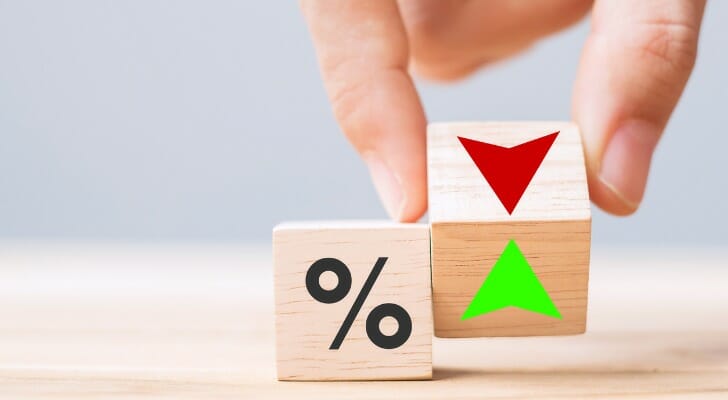As the Federal Reserve increases interest rates to combat inflation and prevent an overheated economy, the effects are felt throughout the economy and household finances. Many things that happen as a result can hurt your finances if you don’t either properly prepare in advance or react quickly to eliminate any potential impact. Working with a financial advisor can help you prepare a proper financial plan and course of action.
What Happens When Interest Rates Rise
Rising interest rates impact your finances in many ways. Some are positive, while others are negative. Knowing what is likely to happen will give you a leg up in preparing your finances to deal with the potential increase in rates.
Here are the six things that typically happen whenever interest rates rise:
1. The Cost of Borrowing Money Increases
As interest rates increase, it becomes more expensive to borrow money. Interest rates are one of the three major factors that determine your monthly payment. The others are the amount borrowed and the time to repay the debt.
Borrowers with variable interest rate debt are affected immediately as rates increase. Existing fixed-rate loans are not affected, but payments for new debt can go up considerably.
For example, if you want to borrow $300,000 for 30 years, the payment can increase significantly with rising interest rates. At 2% interest, your monthly payment is $1,108.86. However, when rates increase to 4%, the payment increases to $1,432.25 per month, which is almost 30% higher.
2. Consumer Demand Decreases
When it costs more to borrow, consumers tend to reduce how much they spend. Unless their income increases too, the rising interest rates shrink their disposable income. Because they are paying more for their purchases, they have less money available to buy other items. This “cooling” of consumer spending is the goal of the Federal Reserve when it increases rates.
3. Savers Earn More Interest
People who have money in savings accounts, money market accounts and CDs benefit from rising interest rates. Banks increase the rates they pay to attract new customers and retain deposits from existing customers.
Savings accounts and money market accounts typically increase within a month of the Federal Reserve increasing rates. However, your CD’s rates are fixed until it matures. New CD rates vary based on market rates, the CD term and the bank’s funding needs.
4. Stocks Become Less Attractive

When investors can earn higher interest on bank deposits and bonds, stocks become less attractive. In essence, investors don’t have to accept as much risk to generate the same returns on their money. Because of this, some investors sell off some positions and reallocate that money into CDs, bonds and money market accounts.
5. Bond Values Drop
Higher interest rates lead to the reduced value of existing bonds. When an investor can receive a higher return on a newly issued bond, there is less demand for existing bonds with lower rates.
On the plus side, although the current price is lower, if you hold onto your bond until maturity, you’ll receive the full face value. That is not the case with bond mutual funds and ETFs. They reprice daily based on the value of the bonds within the portfolio and rarely hold bonds until maturity.
6. Buying a Home Is More Expensive
Household budgets and underwriting limits place a cap on how much homeowners can pay each month for their mortgages. Prospective homebuyers have a harder time qualifying to buy a home as rates increase. The higher rates increase the monthly payment needed to buy their home.
Until sellers are willing to accept a lower offer, many homeowners are priced out of the market. With a limited budget, they have to buy a smaller home, search in a different area or compromise on other factors. In some cases, they delay their purchase until they can find a better deal.
How to Benefit From Rising Interest Rates
While rising interest rates can negatively affect many portions of your portfolio, there are ways to benefit from higher rates. Here are a few things you can do to benefit from interest rates going up:
- Lock in debt at fixed rates: Whenever possible, convert variable debt into fixed rates to avoid higher payments.
- Increase retirement plan contributions: Stock prices can be more volatile during periods of rising interest rates. Increasing your retirement plan contributions allows you to buy more shares at lower prices.
- Look for deals: As interest rates increase, some people cannot afford their rising payments. They may be willing to sell assets at a discount to pay off their debt.
- Don’t panic: With a comprehensive financial plan, short-term fluctuations in values shouldn’t alter your strategy. Follow the plan and discuss any potential changes with your advisor.
Ultimately, you may want to discuss how interest rates could impact your investments with a proven financial advisor who can help you manage your portfolio.
Bottom Line

If you’re wondering what happens when interest rates rise, the answer depends on the portion of your finances. Rising interest rates typically make all debt more expensive, while also creating higher income for savers. Stocks, bonds and real estate may also decrease in value with higher rates. You can take defensive action to help prepare for bad economic times while growing your overall finances.
Tips for Dealing With Inflation
- A strong financial plan can help you prepare for inflation or an economic drop. Having a financial advisor in your corner can help you ensure you’re prepared for all situations. Finding a financial advisor doesn’t have to be hard. SmartAsset’s free tool matches you with up to three vetted financial advisors who serve your area, and you can have a free introductory call with your advisor matches to decide which one you feel is right for you. If you’re ready to find an advisor who can help you achieve your financial goals, get started now.
- Inflation is a silent killer for retirement portfolios. If your retirement income doesn’t keep up with rising costs, your purchasing power will decrease over time. Our inflation calculator forecasts the rising cost of items over time due to inflation.
©iStock.com/SDI Productions, ©iStock.com/Panuwat Dangsungnoen, ©iStock.com/Chainarong Prasertthai
